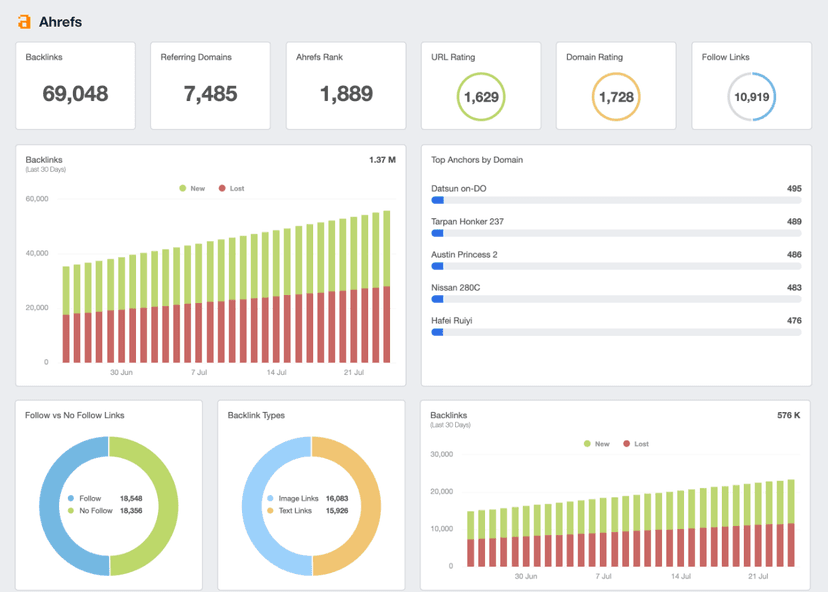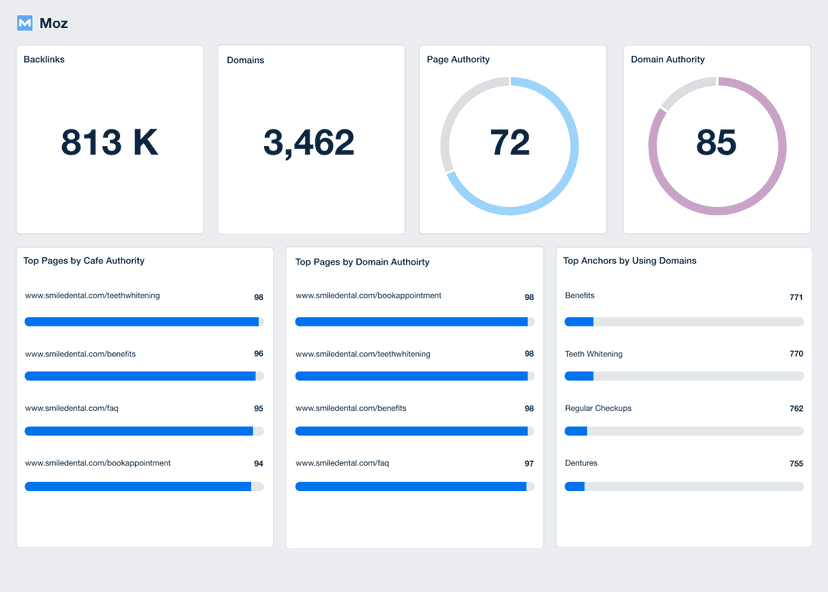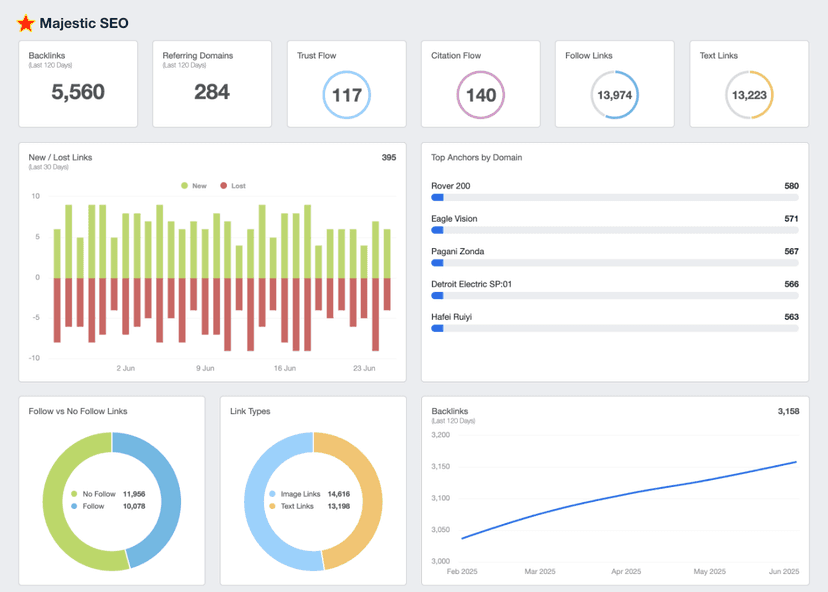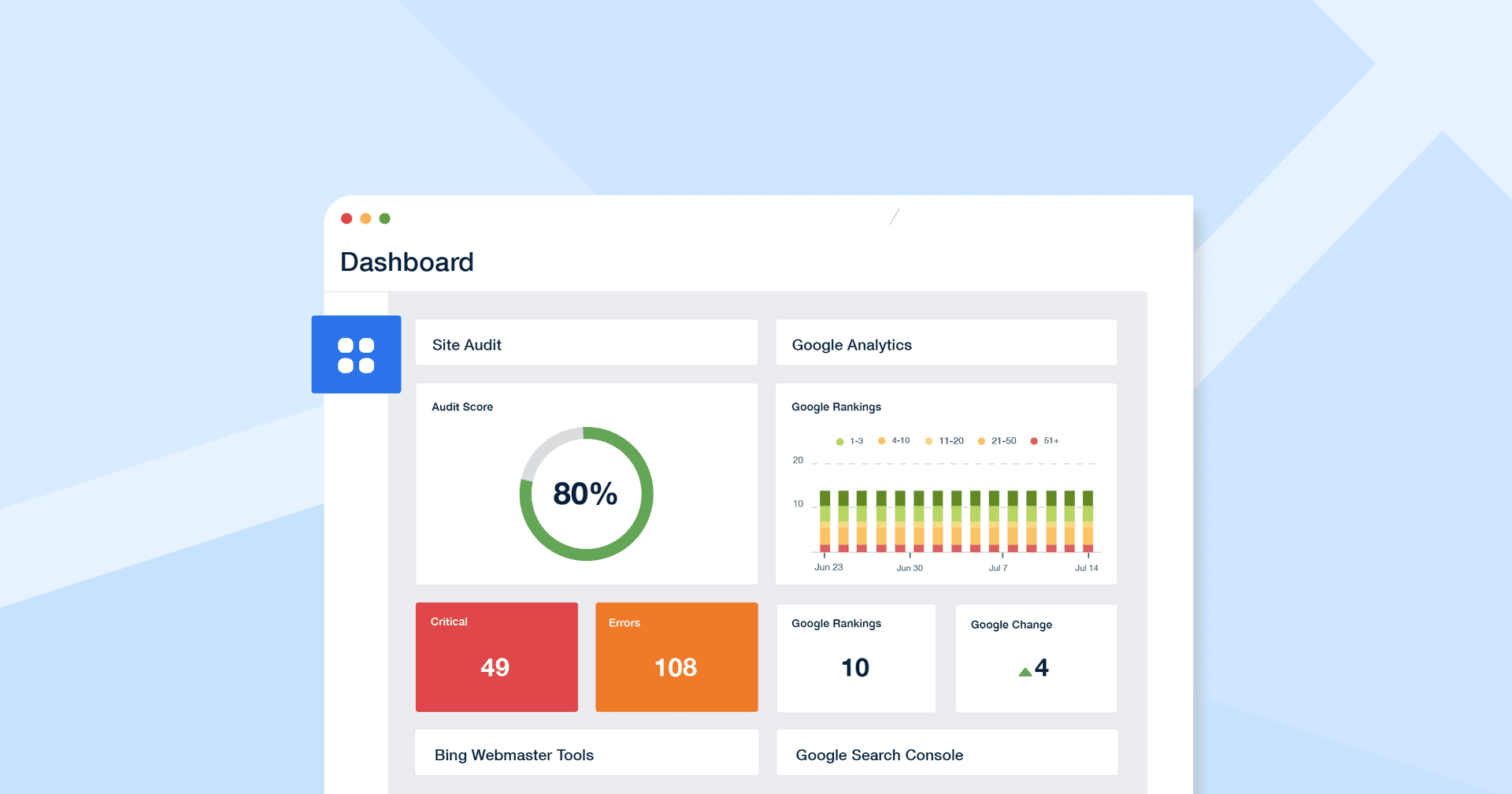Domain Score
SEO Strategy Refinement
Prioritize SEO efforts and place more focus on improving weaker domains.
Robust Competitor Analysis
Compare domain strength against competitors for better market positioning.
Link Building Opportunities
Evaluate the weight and value of backlinks based on this score. Then, use it to focus on fruitful opportunities.
Data-Driven Progress Tracking
Monitor Domain Score improvements over time to assess SEO campaigns.
Why Domain Score Is Important
Domain Score plays a vital role in assessing a website's competitiveness in search rankings. This term is used in the Semrush platform, but similar variations exist in other SEO tools. For example, this includes Moz Domain Authority (DA) and Ahrefs Domain Rating (DR).
A higher Domain Score improves SEO performance and may be considered a Google ranking factor, which could result in heightened content visibility. It also serves as a valuable benchmark for comparing site strength against competitors. Because of this, it’s a valuable KPI in client reporting and showcasing the impact of SEO efforts.
Additionally, a strong Domain Score enhances link-building strategies since backlinks from authoritative sites often have more influence.

Stop Wasting Time on Manual Reports... Get SEO Insights Faster With AgencyAnalytics
How Domain Score Relates To Other KPIs
Domain Score is closely tied to other key performance indicators (KPIs), particularly those focused on SEO and site performance. A higher Domain Score helps improve Keyword Rankings and Organic Traffic in search engine results. It’s also closely linked to Backlink Profile since strong, high-quality linking domains help increase this score. In turn, this naturally attracts more authoritative external links.
While Domain Score doesn't directly affect Conversion Rates, an increase in qualified traffic from higher rankings may have a positive influence over time. Additionally, a strong score may enhance Page Authority, making individual pages more competitive in Google search results.
As a site’s visibility improves, user engagement metrics like Bounce Rate and Time On Site may also noticeably improve. All these contributing factors lead to higher domain authority scores, better results on search engine results pages, and more credibility.
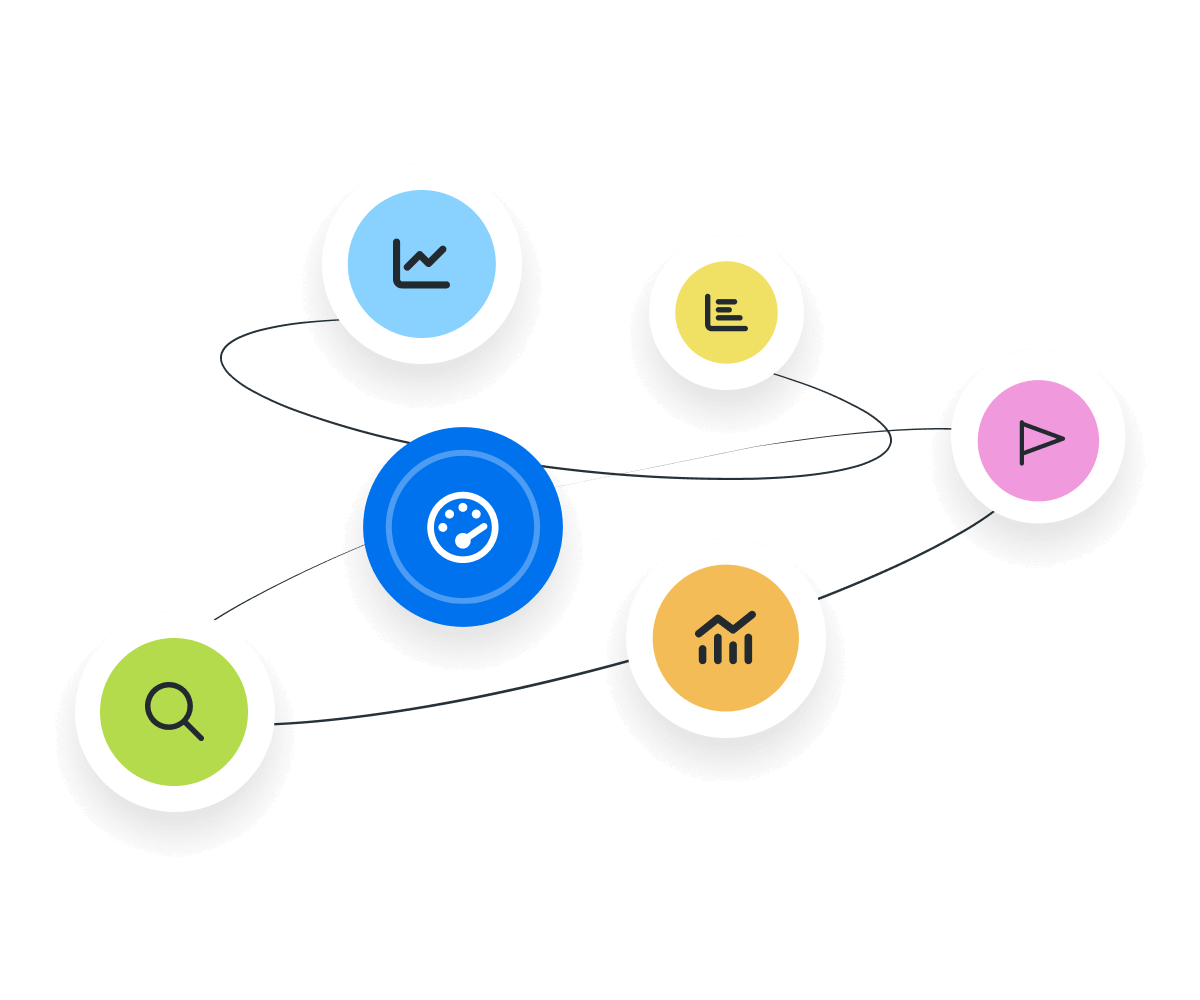
Key Factors That Impact Domain Score
Several key factors influence a website's Domain Score. High-quality backlinks from other sites will significantly improve this metric, while links from low-quality sources often harm it.
Having a diverse range of linking root domains is more valuable than having too many referring domains from a single source. High-quality content also plays a key role, as it naturally attracts backlinks and offers user search relevance.
Additionally, consider the impact of technical website elements. A well-organized website structure, solid technical SEO practices, and fast load times all enhance search crawlability. These factors ensure a smooth user experience, which strengthens Domain Score by extension.
Domain age also contributes to the bigger picture. Older domains typically gain more authority over time (especially since SEO efforts take a while to materialize). Finally, a strong internal linking strategy helps distribute authority throughout the site, improving Domain Score over time.

KPIs are common metrics the client and our agency agree are valuable. This allows us to have beneficial conversations and move their business in the direction they want. We’re not wasting time or resources on anything the client doesn’t understand.
How To Calculate Domain Score
Domain Score is automatically calculated by SEO tools like Semrush through complex, proprietary algorithms. While there’s no manual formula, many key factors contribute to this final score. These include the quality and quantity of backlinks, the number of referring domains, and link trustworthiness. Content relevance and technical SEO (e.g., page speed and internal linking) also play important roles.
What Is a Good Domain Score?
A good domain authority score varies depending on the specific industry and competition level. Generally, a number between 20 and 50 is considered moderate and reflects a well-established site with decent SEO practices. Scores between 50 and 70 indicate high authority, typical of sites with strong backlink profiles.
Anything above 70 is considered very high authority, usually reserved for major websites or brands. Rather than aiming for a specific score, it's more important to have a higher Domain Score than competitors, as this may lead to better rankings and visibility.
What Is a Bad Domain Score?
A bad Domain Score typically falls between 0 and 20, indicating low authority. This is common for newer websites or those with weak SEO practices (e.g., a lack of quality backlinks or poor content relevance). Sites with low scores may struggle to rank well in search engine results, which may limit visibility and organic traffic.
While a low score isn't necessarily permanent, it signals a need for improvement. Top priorities should include acquiring more high-quality backlinks, ensuring content quality, and evaluating technical SEO.
How To Set Domain Score Benchmarks and Goals
Start by researching the scores of competitors in a specific industry and setting realistic benchmarks. Based on this analysis, set achievable short-term and long-term goals. For example, if competitor websites have an average domain authority score of 40, aim for incremental improvements (e.g., achieving a 5 to 10-point increase over six months) until your client’s domain eventually surpasses that score.
To meet benchmarks, focus on improving backlink quality, increasing referring domains, optimizing technical SEO, and publishing relevant content. Use a credible domain authority checker to monitor this number and make strategy adjustments as needed.
Why Domain Score Matters to Clients
Domain Score matters to clients because it’s a strong indicator of a website's authority, trustworthiness, and visibility. A higher score suggests that a site is more likely to appear at the top of organic search results, which drives more organic traffic and improves brand credibility.
For clients, this means better opportunities for lead generation, website traction, and overall business growth. Additionally, a website’s domain authority reflects whether SEO strategies are effective enough. Strong performance gives clients confidence that their online presence is competitive and aligned with industry standards.
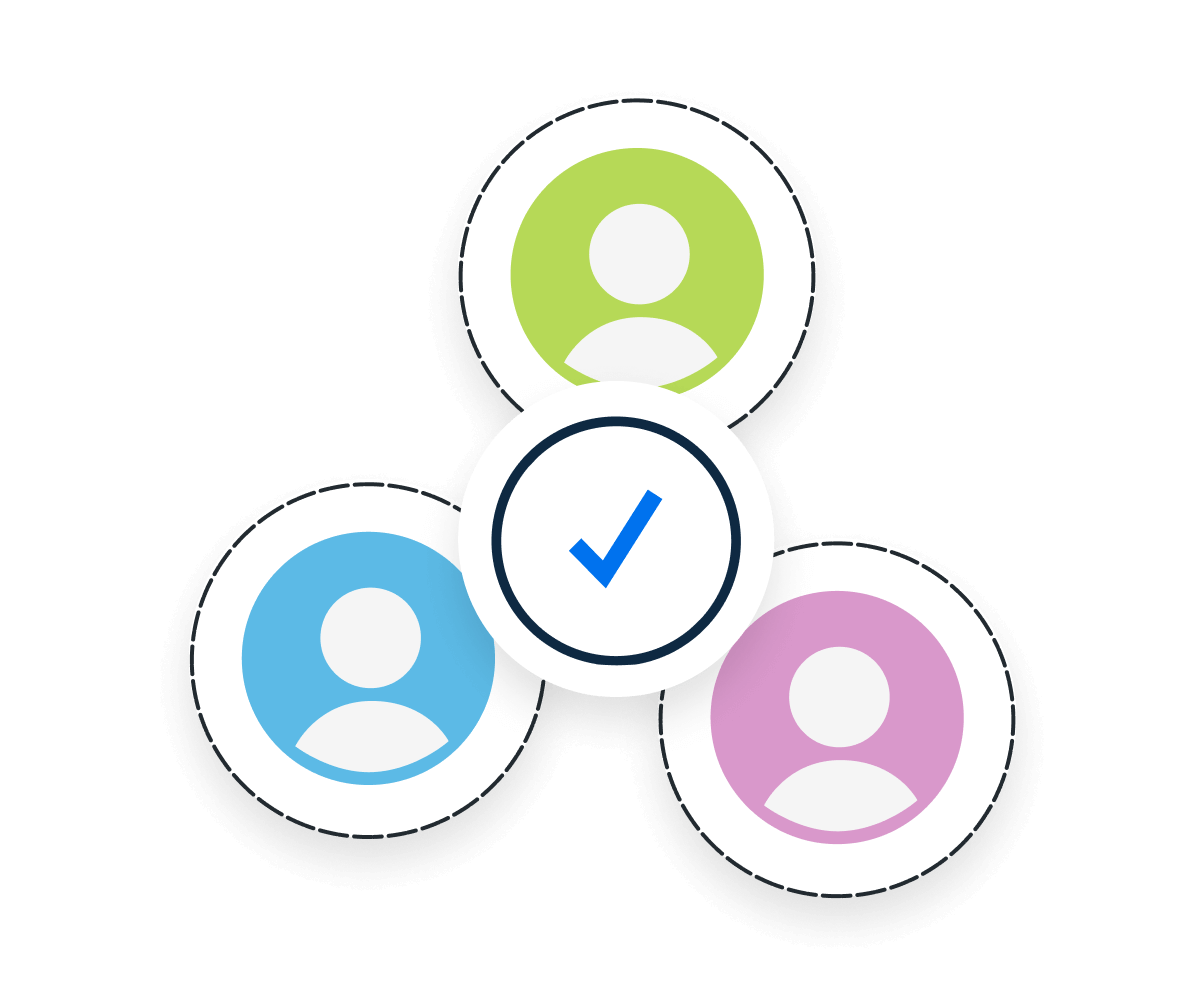
Why Domain Score Matters to Agencies
Domain Score matters to agencies because it reflects the effectiveness of their SEO strategies. A higher score signals success in building authority, trust, and visibility for client websites, helping agencies show a clearer value proposition.
This is essential for showcasing measurable progress, attracting new business, and staying competitive in the industry. Moreover, a higher Domain Score strengthens the agency's reputation for delivering concrete results. In turn, it becomes easier to justify marketing investments and foster long-term client retention.

Unlock precise, actionable insights in just a few clicks.
Best Practices When Analyzing and Reporting on Domain Score
When reporting on Domain Score, it’s important to follow a structured approach to ensure accuracy. Follow these best practices to deliver impactful results that lead to more clarity.
Ensure Data Accuracy
Use reliable SEO tools to measure Domain Score, which ensures accurate conclusions and informed strategy decisions.
Analyze Over Time
Track Domain Score trends over a consistent period instead of relying on a single snapshot. This helps identify patterns, improvements, or declines.
Put in Context
Always interpret Domain Score within the context of industry and competitors. Use this to assess site performance within a specific niche.
Align to Client Goals
Ensure Domain Score aligns with client goals. These may include increased search visibility, higher traffic, or more conversions.
Visualize Performance
Utilize visual representations like graphs and charts to show Domain Score changes. This makes it easier for clients to grasp progress and trends.
Include Recommendations
Provide recommendations on how to improve or maintain Domain Score. This adds value to the report and helps guide future SEO efforts.
We don’t just hand over reports; we put a spotlight on the key performance indicators (KPIs) that matter most to our clients, showcased prominently with their goals in mind. Each KPI gets its own stage, making it effortless for our clients to follow their journey.
Semrush Dashboard Example
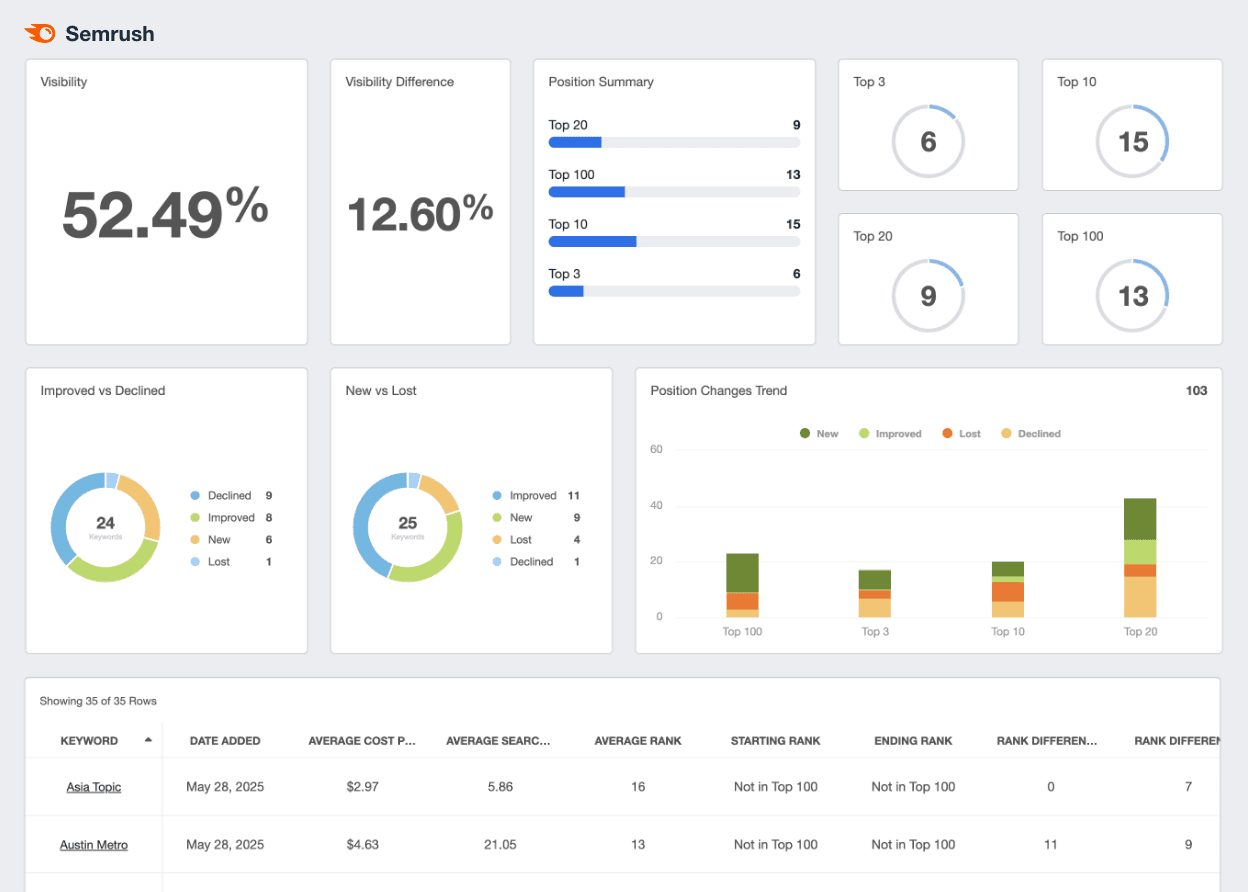
Related Integrations
How To Improve Domain Score
Improving Domain score requires a strategic focus on several key SEO practices. Here are some practical tips to get started and increase this key metric.
Build High-Quality, Relevant Backlinks
Focus on acquiring authoritative backlinks and building authority. Explore guest posting, partnerships, and PR outreach.
Improve Technical SEO Elements
Boost site speed, improve mobile friendliness, and fix broken backlinks. A solid structure also ensures the site is easy to navigate.
Optimize On-Page SEO Strategies
To improve search visibility, use targeted keywords, add key metadata, and ensure proper internal linking throughout the website.
Related Blog Posts
See how 7,000+ marketing agencies help clients win
Free 14-day trial. No credit card required.


